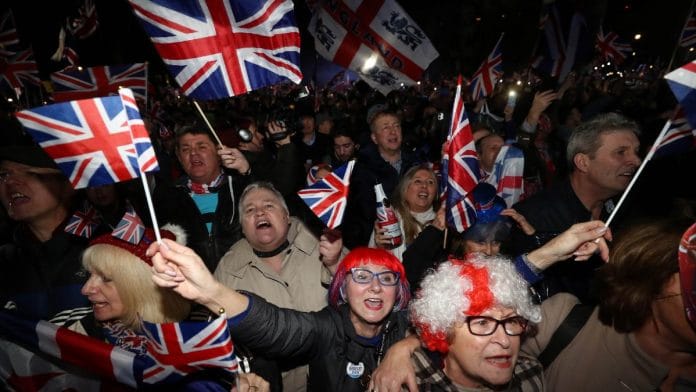New Delhi: Indians are now the United Kingdom’s largest immigrant community — and their political influence has only grown with their numbers. According to a new survey report, the community will be an important swing voting block if an election were held in the UK tomorrow.
However, the diaspora’s position on the UK’s political spectrum is unclear. Although most British Indians still identify with the Labour Party as they have traditionally done, “anecdotal evidence and limited survey data” suggests they have become less left-leaning in recent years, the report said.
According to the survey, 41 per cent of the respondents said they identified with the Labour Party and 31 per cent indicated an affinity for the right-of-centre Conservative Party — which is not much of a gap.
This move to the right seems to be driven by Hindus and Christians. While a majority of Muslim and Sikh respondents support the Labour Party, greater numbers of Hindus and Christians are throwing their weight behind the Conservative Party, the survey found.
Around 42 per cent of Hindu respondents and 40 per cent of Christian respondents are Conservative, as opposed to 19 per cent and 26 per cent of Muslim and Sikh respondents, respectively.
The report, ‘Britain’s New Swing Voters? A Survey of British Indian Attitudes‘, is authored by Caroline Duckworth and Milan Vaishnav from the Carnegie Endowment for International Peace, and Devesh Kapur from Johns Hopkins-SAIS. It is based on the Survey of British Indian Attitudes (SBIA), conducted by the Carnegie Endowment for International Peace and Johns Hopkins-SAIS. The SBIA is an online survey of 792 British Indian voters, conducted in August 2021.
Also Read: When it comes to British rule, rich, powerful Indians were complicit every step of the way
Polarised on India, undecided on Britain
Indians account for roughly 2.5 per cent of the UK’s population. The growing diaspora has been a major focus for Prime Minister Narendra Modi, who addressed a packed Wembley Stadium in London shortly after being elected.
However, Modi is not as popular among British Indians as he is among the American diaspora: only about 19 per cent of British Indians approve of Modi’s performance as Prime Minister. In comparison, 48 per cent of Indian Americans approve of Modi.
Among Conservative supporters, 31 per cent approve of Modi, while 55 per cent disapprove. His popularity is significantly lower among Labour supporters, at around 13 per cent.
The divide is clearer when religion is taken into account: 37 per cent of Hindus approve of Modi and 43 per cent disapprove. Among Muslims, not a single respondent approves of Modi and 93 per cent disapprove. Overall, the report concludes that Conservatives and Hindus demonstrate greater approval of Modi.
A majority of British Indians are also dissatisfied with UK Prime Minister Boris Johnson: only 37 per cent of Indians in the UK approve of him. If a hypothetical election were to be held, Labour leader Keir Starmer would the most popular candidate, followed closely by Rishi Sunak, currently Chancellor of the Exchequer.
Sunak, who is Conservative, might be an odd choice — but the authors of the report say that the explanation is simple partisanship. British Indians think highly of Sunak, but would still prefer a Labour politician to be Prime Minister. The survey also reports that Sunak is far more popular than Johnson and fellow high-profile British Indian politician, Priti Patel.
Not as engaged as Indian Americans
The survey finds that unlike their counterparts across the pond, members of the British Indian diaspora are not as engaged in civic duties such as participating in community meetings and doing voluntary service.
However, British Indians are more likely to discuss politics with family and friends when compared to Indian Americans — even though Indian Americans are more likely to post political comments online or donate money and time to political campaigns.
In terms of political issues, British Indians are most concerned by kitchen table issues like the economy and healthcare. They are also concerned about climate change. Another key finding is that most British Indians don’t think of UK-India relations as a top political issue, and don’t hold very strong views on the Johnson government’s policies towards India.
(Edited by Asavari Singh)
Also Read: UK defence firms should invest, make, co-create, co-develop in India: UK India business body






